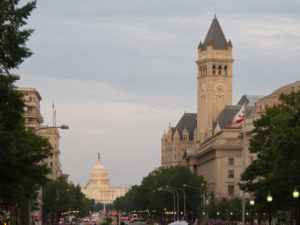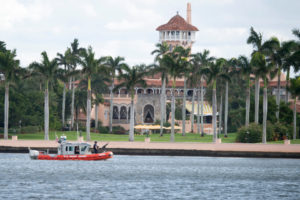Can You Say, ‘Emoluments’?
The Founding Fathers weren’t fortune-tellers, but they did predict a future with someone like Donald Trump when they crafted the anti-corruption provisions in our Constitution.

The Emoluments Clause ensures that officials don’t sell-out to other governments or use their position to line their pockets. Well, that’s the intent.
“Emolument” is a word rarely used in recent decades. The word means profit or salary or fee and as used in the late 18th Century when our Constitution was written it referred to any compensation beyond the official salaries of government officers.
Concern about government officials being corrupted if they were paid by anyone except the taxpayers was so important to the Framers that they put it into our Constitution three times, twice in Article I, the legislative section, and once in Article II, the executive section.
Of the three clauses, the most significant for Trump and his bosses –the people — is the Domestic Emoluments Clause in Article II. It refers directly to the president.
The first two clauses make it clear that no government official can be paid by a foreign power.

The third clause goes further. It states that the compensation paid to our president cannot increase or decrease during his term. Then it goes on to bar any emoluments from the “United States, or any of them.”
That means a president cannot profit from any payments by our federal government or by any of the state governments.
There is an escape clause, one that mattered when Ronald Reagan was president. Payments by the federal government and the states are barred unless the president gets permission from Congress to keep the money.
Trump is being sued by various representatives and senators, attorneys general and nonprofit enterprises which assert he is illegally collecting emoluments from domestic governments through his hotel, golf, restaurant and real estate businesses.
This could all be resolved if Congress gave Trump permission to collect emoluments. It hasn’t.
This issue last arose when Ronald Reagan became president in 1981. He almost ran into trouble with the emoluments clause because of the California state government pension he collected for his eight years as governor. The Justice Department determined that Reagan’s retirement benefits didn’t violate the “spirit of the constitution,” or cause any improper influence because he was entitled to the payments.
That is a different emolument than the kind Trump is collecting.

When Trump stays at Mar-a-Lago, or First Lady Melania Trump stays at Trump Tower in New York, the Secret Service must rent rooms from Trump’s business. By law, the government must pay commercial rates. Such rates include a profit for the owner.
This is problematic because the president can’t make money from the government other than his salary, said Jordan Libowitz, communications director for Citizens for Responsibility and Ethics in Washington. The organization is suing Trump over what it and others say are emoluments clause violations.
“The presidency is a full-time job, not a side gig,” Libowitz said, later adding that while it’s legal for a president to own businesses while in office, but Trump should be more focused on his presidency than the business.
What litigation, or action by Congress, could resolve if whether it is legal for any president to profit off sales to the government, such as the fees paid to Trump golf courses for electric carts Secret Service agents ride in while he plays the game.
Raquel Coombs, a spokeswoman for the Maryland Attorney General, said the rents collected from properties and his continued involvement with his business make him susceptible to corruption.
Coombs also pointed to another problem with state governments buying services from Trump when they are also dependent on Washington for funds that the administration controls. “No state should be in competition with another state,” Coombs said when it comes to the president’s business.
There’s s debate about what the word emolument means and how it can be applied to modern law from a Constitution that’s over 200 years old.
“The word emolument isn’t a word people use every day anymore,” said Seth Barrett Tillman, a Lecturer at Maynooth University Department of Law in Ireland.
Tillman explained how George Washington bought land in Washington D.C. at a public auction during his term as president, a clear transaction between Washington and the government, as an example of how the word emolument can’t mean what it’s being used as today. Washington didn’t get any backlash for buying the land and wouldn’t knowingly violate the Constitution he helped write, Tillman said.
Still, that is different from what Trump is doing because President Washington paid the government for the land, while Trump is continually profiting from sales to the government.
Tillman still thinks Trump could have done more to build a wall between his businesses and his official position, even assuming the clause does not apply to profits from government purchases from Trump Organization enterprises.
This broad view is found in formal ethics opinions relied on by the Export-Import Bank of the United States. The opinions said that even if there isn’t a legal violation of the Emoluments Clause, it’s still important for federal employees to be aware of appearances of conflict-of-interest violations.
Trump owns more than 500 businesses abroad and domestically. Even though Trump says that he has turned over management of the businesses to his two older sons, Donald Jr. and Eric, the profits still flow to him. That means that he is profiting from purchases by the Secret Service, state officials and others that seem clearly to violate the third emoluments clause, but without a doubt creates the image of a conflict of interest that the Ex-Im Bank ethics opinions warned against.
Featured Photo: On May 15, 2017, Washington artist Robin Bell projected various comments, including the emoluments clause, on the facade of the Trump International Hotel.



